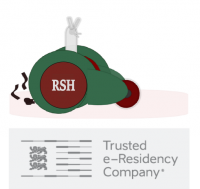Can I use subcontractors?
You can use subcontracting and cover the costs which contribute directly to the services/products you provide to your customers. There are no limitations to the nature, size or geographical location of the subcontractors you hire. You can transact with subcontractors directly, or via different marketplaces (e.g. Upwork, Freelancer.com etc). In case the subcontractor is a non-incorporated private person who can’t issue a proper invoice, please sign a simple written agreement with him/her and store it for compliance purposes.
In case you communicate and transact via marketplaces (e.g. Upwork), the records automatically stored there are sufficient. Note that it’s not your duty to check the validity of the supplier’s VAT number. If you have a valid VAT registration, and you purchase something from a company registered in the EU who also have a valid VAT registration, notify your vendor of your VAT number in advance to receive a correct purchase invoice (0% VAT if the vendor is in the EU but outside Estonia; 20% if the vendor is in Estonia). Otherwise, the vendor will add VAT, and this cannot be refunded retroactively.
Can I hire an intern/trainee?
Yes, it’s possible to hire an intern under regular hiring terms. However, your company should clearly benefit from offering the opportunity to the intern and it should be related to your current projects. From the subcontracting point of view, there shouldn’t be a separate internship agreement, but instead a regular subcontracting agreement for the services to be delivered. Which means from the start the intern’s tasks should be classified as subcontractor’s work and paid accordingly.
How can I hire employees/subcontractors outside Estonia?
If you need to hire somebody based outside Estonia, your Estonian company is a suitable model for hiring independent freelancers or subcontractors across the globe. There are two methods for paying freelancers:
-
If the freelancer is a non-incorporated individual (outside Estonia) and cannot issue a proper invoice, a simple written agreement between your company and him/her is sufficient evidence as proof the payment was for provided services (time sheets and other such written documentation are advisable). If the work for these services is performed outside Estonia, there’s no need to register the cooperation in any public registry in Estonia, and no related income or social taxes are paid by your company in Estonia. Your company pays him/her the sum agreed, and the freelancer is responsible for declaring and paying the relevant income and social taxes, in the country where he/she operates OR
-
The freelancer issues your company an invoice for his/her services in the name of his/her legal entity. The invoice must also reflect the legal entity’s registration code.
In contrast to cooperating with independent freelancers across the globe, your company cannot hire anybody working outside Estonia on a permanent basis as an official employee on your company’s payroll. This triggers the need to register your company as a non-resident employer in his/her location and comply with local rules and regulations.
How can I hire employees in Estonia?
If your expanding business operations mean you need to hire additional support, there are two main types of contractual arrangement.
-
If the person has a legal entity in Estonia (OÜ or FIE), your company can hire him/her as a subcontractor
-
If the person does not have a legal entity in Estonia, your company can hire him/her as an employee, either full-time or part-time
In the first case, he/she operates formally as a subcontractor and issues invoices (under the name of his/her legal entity) for the services provided to your company. You might want to have a written contract with his/her legal entity to agree the terms and conditions of the cooperation, but there’s no need to register it in any official registry in Estonia. No additional fees are imposed by LeapIN.
In the second case, he/she operates formally as an employee of your company. That means you need a written employment agreement with him/her (we’ll provide the template) at the beginning of your cooperation. Based on the data from the employment agreement we register him/her in the official Employment Registry of Estonia.
Your company pays him/her a salary to remunerate the services provided. As he/she works in Estonia, all taxes on the salary are declared and paid in Estonia. You can use a standard calculator to determine the total tax amount your company has to pay. LeapIN prepares the salary payments according to the agreement, you execute the payments and we declare the relevant taxes in Estonia.
We’ll notify you when to pay the taxes and how much. Taxes in Estonia are paid on a monthly basis. For example, if you pay an employee salary in May, the relevant taxes will be declared and paid by June 10th.
If you decide to terminate your employee’s agreement, please inform us of the termination date and the further conditions you agreed on. We’ll notify the local authorities accordingly and let you know about any final payments to be taken care of. In the case of subcontractors, there’s no need to inform us nor local authorities about the termination.
Can I employ foreign nationals with tax residence outside Estonia on my payroll?
No. The most convenient option for your business would be subcontracting the necessary freelancer resources.
REF :If you wanna be e-residence and opening a company contact to https://www.xolo.io/


